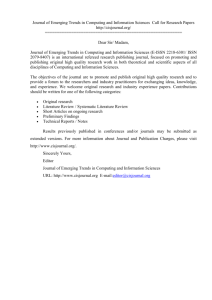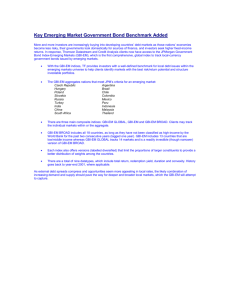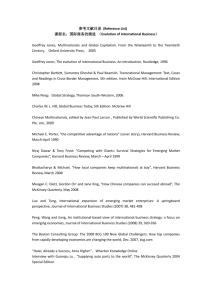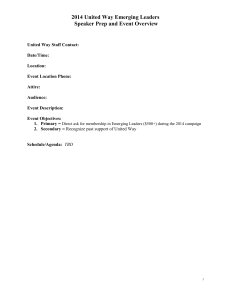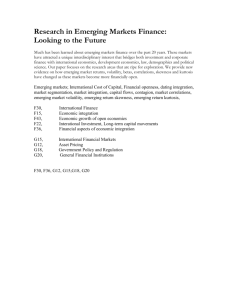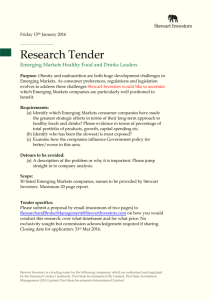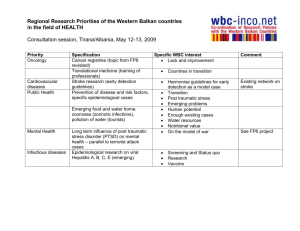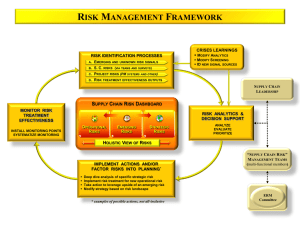Course Proposal: Doing Business in Emerging Markets
advertisement
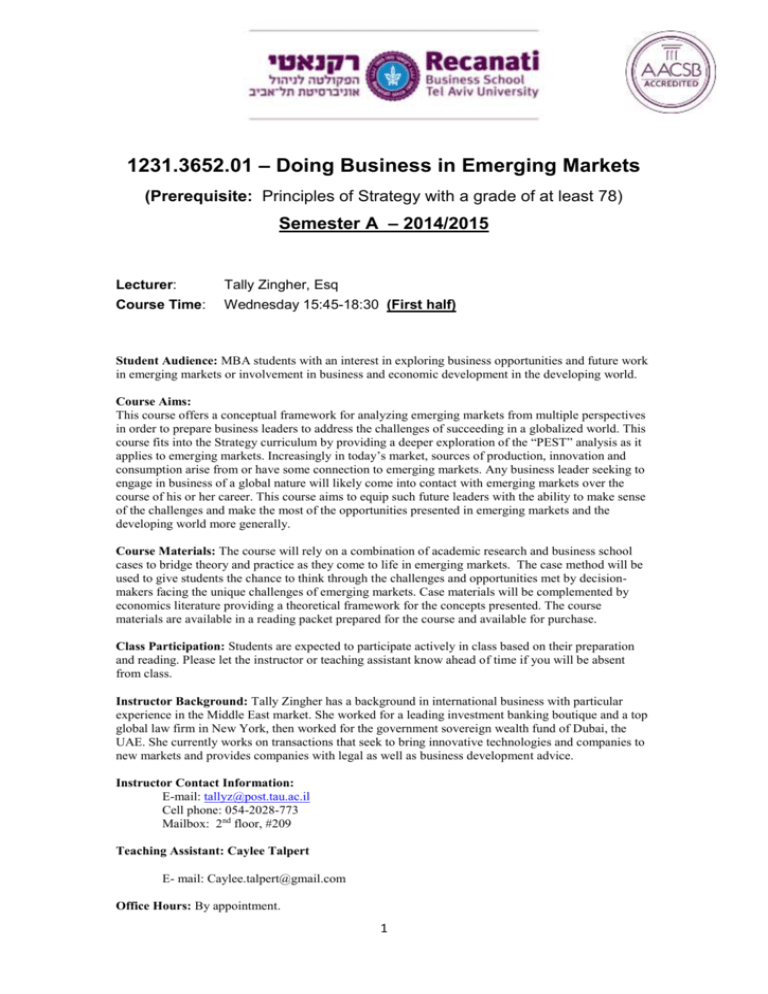
1231.3652.01 – Doing Business in Emerging Markets (Prerequisite: Principles of Strategy with a grade of at least 78) Semester A – 2014/2015 Lecturer: Tally Zingher, Esq Course Time: Wednesday 15:45-18:30 (First half) Student Audience: MBA students with an interest in exploring business opportunities and future work in emerging markets or involvement in business and economic development in the developing world. Course Aims: This course offers a conceptual framework for analyzing emerging markets from multiple perspectives in order to prepare business leaders to address the challenges of succeeding in a globalized world. This course fits into the Strategy curriculum by providing a deeper exploration of the “PEST” analysis as it applies to emerging markets. Increasingly in today’s market, sources of production, innovation and consumption arise from or have some connection to emerging markets. Any business leader seeking to engage in business of a global nature will likely come into contact with emerging markets over the course of his or her career. This course aims to equip such future leaders with the ability to make sense of the challenges and make the most of the opportunities presented in emerging markets and the developing world more generally. Course Materials: The course will rely on a combination of academic research and business school cases to bridge theory and practice as they come to life in emerging markets. The case method will be used to give students the chance to think through the challenges and opportunities met by decisionmakers facing the unique challenges of emerging markets. Case materials will be complemented by economics literature providing a theoretical framework for the concepts presented. The course materials are available in a reading packet prepared for the course and available for purchase. Class Participation: Students are expected to participate actively in class based on their preparation and reading. Please let the instructor or teaching assistant know ahead of time if you will be absent from class. Instructor Background: Tally Zingher has a background in international business with particular experience in the Middle East market. She worked for a leading investment banking boutique and a top global law firm in New York, then worked for the government sovereign wealth fund of Dubai, the UAE. She currently works on transactions that seek to bring innovative technologies and companies to new markets and provides companies with legal as well as business development advice. Instructor Contact Information: E-mail: tallyz@post.tau.ac.il Cell phone: 054-2028-773 Mailbox: 2nd floor, #209 Teaching Assistant: Caylee Talpert E- mail: Caylee.talpert@gmail.com Office Hours: By appointment. 1 Course Structure: Students will be expected to prepare for case discussions or class discussions on reading material. Each class session will include either a case discussion or a lecture followed by discussion of the relevant reading material. Each week, there will be two class sessions, noted by (a) and (b) in the syllabus. Work Product: Each group of 3-4 students will pick an emerging market country to follow closely throughout the semester. They will be expected to explore the issues raised in the readings and class discussion from the perspective of their chosen country over the course of the semester. Assignments: For at least 4 weeks (not including the first week), each group shall submit a 1to-2-page “Assessment” of two issues raised in a case study being discussed in class with respect to the group’s chosen country, relating the experience of the country discussed in the case with the group’s chosen country. A group that submits more than 4 assignments will be able to choose which assignments will count towards their final grade for the class. The Assessments should demonstrate that the group has read the case and should provide analysis of the relevant country in light of the group's understanding of the case. Final Project: A “Final Project” will be required in which each group will be asked provide an in-depth analysis (8-10 pages) of issues raised in the readings and class discussions. The Final Project should review key economic concepts and reflect insights gained during the class discussions and through preparation of the Assessments. I will provide guiding questions for the Final Project, which will be structured as an analysis for a client regarding emerging markets. It is anticipated that thoughtful completion of the Assessments will facilitate the completion of the final project. Submission of Assignments: Assessments must be submitted by Tuesday night at 10pm in order to count as an Assessment for a class meeting take place on the following Wednesday. Submissions should be made via e-mail and any submissions should list the names of each of the members of the submitting group. Group Logistics: Please e-mail me or the course assistant by 10pm on Thursday, April 24 with the name of the members of your group and your 1 st, 2nd and 3rd choice of country. I will confirm group choices by midnight on Sunday April 27. When you choose your country please make sure that enough economics and market data is available for your country choices so as to make the Assessments feasible. Grading: 20% Class participation, 40% Written Assessments, 40% Final Project. Course Outline: The course is divided into 4 sections across 7 class meetings and 14 class sessions: 1. Historic overview of approaches to developing countries: An examination of classical approaches to sources of economic growth and opportunity in emerging markets and the developing world. October 29, 2014 a. Class Session 1(a): Introduction and Course Overview i. Overview of Course aims and Syllabus ii. Stiglitz, Joseph “Markets, Market Failures, and Development”, The American Economic Review, vol. 79, no.2: pp.197-203. 1989. iii. Banerjee, Abhijit and Esther Duflo. 2007. “The Economic Lives of the Poor”, Journal of Economic Perspectives, 21(1), 141-167 b. Class Session 1(b): A Macroeconomic Approach - What is Development Policy and Why Does it Matter? i. “China ‘Unbalanced’” Harvard Business School case 711-010 (on China’s management of its exchange rate). 2. Competitiveness: An examination of competitiveness and its implications for the business sector as well as the manner in which development policies pursued by government affect the shape and structure of the market. November 5, 2014 a. Class Session 2(a): Competitiveness and Market Entry 2 b. i. Porter, Michael “The Competitive Advantage of Nations”, Harvard Business Review, Vol. 68, no 2 (March-April 1990). ii. “Silver Lake and Private Equity in Brazil: Carnaval or Calamity?” Harvard Business School Case 712-004 (exploring the growth of a private equity firm into Latin America). Class Session 2(b): Natural Resources and Competitiveness i. “Angola and the Resource Curse” Harvard Business School Case 711-016 (on natural resources in Angola). November 12, 2014 c. Class Session 3(a): Competitiveness Strategy - Diversification i. “Qatar: Energy for Development" Harvard Business School Case 714-003 (on diversification strategy of Qatar). d. Class Session 3(b): Competitiveness Strategy – Product Space i. Hausmann, Ricardo Jason Hwang and Dani Rodrik. 2005. “What You Export Matters,” NBER Working Paper No. w11905. 3. Institutional Voids and Opportunities in Emerging Markets: An analysis of the role of institutions in shaping emerging markets. This section will examine obstacles faced by multinationals and entrepreneurs in emerging markets and the prospects of market access to the “bottom of the pyramid”. This section will also address the challenges presented by uncertainty in the rule of law in emerging markets and the role of corruption and corporate social responsibility when operating in emerging markets. November 19, 2014 a. Class Session 4(a): Institutions and Market Entry i. “Metro Cash & Carry” Harvard Business School Case 707-505 (analyzing the expansion of a multinational company into India, Russia and China). b. Class Session 4(b): Risk and Volatility i. “Veracity Worldwide in Syria: Assessing Political Risk in a Volatile Environment,” Harvard Business School Case 712-009. (exploring the influence of political risk on corporate decision-making). November 26, 2014 c. 4. Class Session 5(a): Microfinance and the Bottom of the Pyramid i. Stein, Peer, Tony Goland, and Robert Schiff. 2010. Two Trillion & Counting: Assessing the Credit Gap for Micro, Small, and Medium Sized Enterprises in the Developing World, McKinsey & Company, International Finance Corporation of the World Bank Group. ii. Banerjee, Abhijit V. and Esther Duflo. “Giving Credit Where it is Due”, Journal of Economic Perspective, Vol. 24(3):61-79. iii. "The Next 4 Billion: Market Size and Business Strategy at the Base of the Pyramid", IFC and World Resources Institute Report, 2007 (Executive Summary only) State capitalism and corruption in emerging markets: This section will address a common characteristic of emerging markets – the large role of the state; whether through the creation of Sovereign Wealth Funds, state-owned enterprises, or simply an active hand of the state in local markets. Cases studied in this section present the decisions faced by sovereign wealth fund managers, a Russian fund facing expropriation, a state-owned enterprise and Argentina’s debtholders. a. Class Session 5(b): Sovereign Debt i. “The Barber of Buenos Aires: Argentina’s Debt Renegotiation” Harvard Business School Case 706-034 (analyzing the effect of Argentina’s aggressive debt renegotiation). December 3, 2014 b. Class Session 6(a) & 6(b): Sovereign Wealth Funds and their Debt 3 i. “Dubai: Debt, Development, and Crisis” (A) Harvard Business School Case A 710-069 (on Dubai's Debt Crisis). December 10, 2014 c. Class Session 7(a): i. “Hermitage’s Russian Quandary” Harvard Business School Case A 711-054 (describing the challenges faced by a Russian hedge fund due to government expropriation). ii. Khwaja, Asim and Atif Mian. 2005. “Do Lenders Favor Politically Connected Firms? Rent Provision in an Emerging Financial Market,” Quarterly Journal of Economics, Vol. 120(4), pp. 1371-1411. iii. Optional: Olken Benjamin and Rohini Pande "Corruption in Developing Countries" NBER Working Paper February 2012. d. Class Session 7(b): Group Presentations & Closing 4
